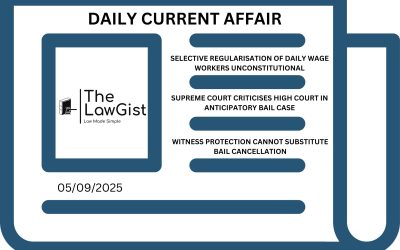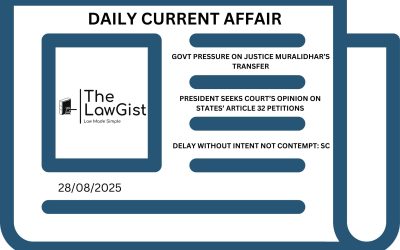
Supreme Court leads with historic reforms—judges’ assets made public, appointment process unveiled, and PowerGrid’s ₹24 crore tariff claim dismissed as operational cost.
DAILY CURRENT AFFAIRS (06 MAY 2025)
SUPREME COURT MAKES HISTORY BY PUBLISHING ASSETS OF JUDGES ONLINE
Case Name: In Re: Declaration of Assets by Supreme Court Judges
For the first time, the Supreme Court has uploaded the asset and liability declarations of its judges on its official website. This historic transparency measure includes details of CJI Sanjiv Khanna and 20 other judges, aimed at enhancing public trust in the judiciary.
LEGAL PROVISIONS
While there’s no specific statutory requirement for public disclosure of judges’ assets, this decision was taken by the Full Court pursuant to its administrative powers. It aligns with Article 124 of the Constitution and the Bangalore Principles of Judicial Conduct, promoting integrity and accountability in the judiciary.
Source: Supreme Court of India
SUPREME COURT PUBLISHES JUDICIAL APPOINTMENT PROCESS FOR PUBLIC ACCESS
Case Name: In Re: Collegium Recommendations and Judicial Appointments (2022–2025)
In a move toward institutional transparency, the Supreme Court released comprehensive records of the Collegium’s judicial appointments from November 2022 to May 2025. It includes names, categories, recommendations, and criteria considered for both High Court and Supreme Court judges.
LEGAL PROVISIONS
The appointment of judges is governed by Articles 124 and 217 of the Constitution. The Collegium system, though evolved through judicial interpretation (Second and Third Judges Cases), now includes a public-oriented disclosure policy to promote accountability without undermining confidentiality.
Source: Supreme Court of India
REPLACING DAMAGED TRANSFORMERS IS OPERATIONAL EXPENSE, NOT CAPITAL WORK: SC
Case Name: Powergrid Corporation of India Ltd. vs. Central Electricity Regulatory Commission & Ors.
The Supreme Court rejected PowerGrid’s claim seeking tariff hikes to recover ₹24 crore spent on replacing damaged transformers, holding it as a routine operational expense, not eligible as additional capital expenditure under tariff regulations.
LEGAL PROVISIONS
The Court interpreted Regulation 53(2)(iv) of the CERC (Terms and Conditions of Tariff) Regulations. It ruled that transformer replacement doesn’t qualify as ‘additional work’ and must be absorbed as operational maintenance under existing norms for transmission utilities.
Source: Supreme Court of India
Also Read: DAILY CURRENT AFFAIRS (05 MAY 2025)







